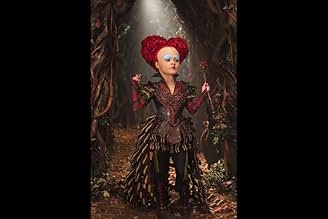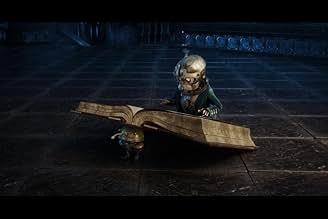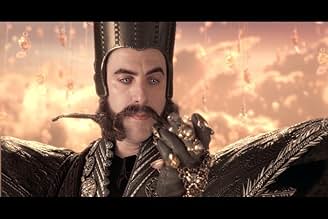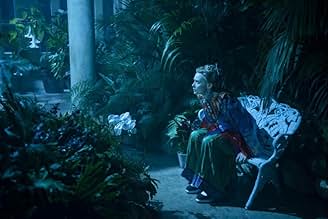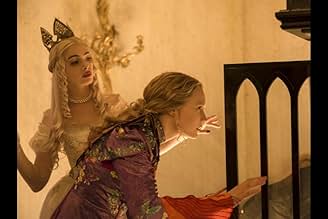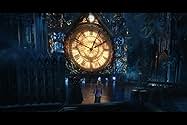Alice retorna ao curioso País das Maravilhas e viaja ao passado para ajudar o Chapeleiro Maluco.Alice retorna ao curioso País das Maravilhas e viaja ao passado para ajudar o Chapeleiro Maluco.Alice retorna ao curioso País das Maravilhas e viaja ao passado para ajudar o Chapeleiro Maluco.
- Prêmios
- 4 vitórias e 20 indicações no total
Alan Rickman
- Absolem
- (narração)
Timothy Spall
- Bayard
- (narração)
Paul Whitehouse
- Thackery
- (narração)
Stephen Fry
- Cheshire Cat
- (narração)
Barbara Windsor
- Mallymkun
- (narração)
- Direção
- Roteiristas
- Elenco e equipe completos
- Produção, bilheteria e muito mais no IMDbPro
Enredo
Você sabia?
- CuriosidadesAlan Rickman's last movie. He died four months before the release. This movie is dedicated to his memory. His final non-voice acting role was in Decisão de Risco (2015), which was released before he died.
- Erros de gravaçãoEarly in the movie Alice directs her crew to heel to port. Visually, the ship heels to starboard.
- Citações
Cheshire Cat: [from trailer]
Cheshire Cat: When the day becomes the night and the sky becomes the sea, When the clock strikes heavy and there's no time for tea. And in our darkest hour, before my final rhyme, she will come back home to Wonderland and turn back the hands of time.
- Cenas durante ou pós-créditosA dedication to the late Alan Rickman appears right when the first part of the end credits finish.
- ConexõesFeatured in AniMat's Reviews: The Jungle Book (2016) (2016)
Avaliação em destaque
After spending a year sailing around the world, Alice Kingsleigh (Mia Wasikowska) returns home to London to find that her mother (Lindsay Duncan) has sold off their shares in the trading company that had been backing her journeys - to scorned suitor Hamish (Leo Bill). Facing the end of her career as a sea captain, Alice escapes her distressing surroundings by jumping through a magical mirror that transports her to Underland. Once there, she discovers that her good friend Hatter Tarrant Hightopp (Johnny Depp) has grown deathly ill at the thought of never seeing his family again. Determined to help, Alice discovers she must travel back into the past using Time's (Sacha Baron Cohen) "chronosphere" to undo the events that would lead to the demise of Hightopp's troupe. Disregarding the clock-keeper's warnings, Alice steals the device, unwittingly setting into motion a chain of events that will threaten the very existence of her beloved alternate world and all of its inhabitants.
The film starts off like a "Pirates of the Caribbean" yarn, sporting a young skipper engaging in high seas battles, spouting orders to disapproving minions, and succeeding in impossible feats of seafaring luck. Impossible for anyone unfamiliar with the realm of Underland, that is. For Alice, anything is possible; for the audience, this belief in spontaneous, inexplicable happenings becomes extremely annoying, very quickly. Every predicament is hopelessly insincere, since solutions can be invented on a whim. No real peril - and therefore no sense of genuine adventure - can exist in a world where nothing is clearly defined.
It seems contradictory to criticize a picture based on the works of Lewis Carroll for being too unrealistic. More specifically, it's not as much an issue of realism as it is reasoning (or explanation), which again might sound contrary to the obviously absurdist concepts that populate Carroll's visions. But when everything is nonsensical, the plot and the characters generate little purpose or drive. Motives and emotions become pointless and hollow. It's a bit like watching a program for toddlers; it's full of colors and sounds and commotion, but it serves merely as a distraction, instead of as thought-provoking entertainment. To anyone not enthralled by the manifestation of key elements from the original stories, this lack of engagement is insulting to the intelligence.
As for the look, even though Tim Burton is no longer directing, the sets and environments are still dark and morbid. With its classic sentiment of an escape from oppression or conflict - or simply retreating into the imagination - the film seems to scrape the edges of significantly heavier material, like "Sucker Punch" or "Pan's Labyrinth" or, visually, "Crimson Peak." But Depp always seems to pop up at random moments to force the mood back into utter lunacy, with his exaggerated, cartoonish movements, grotesquely thick and vivid makeup (which ought to be added to Wasikowska's incredibly pale features), and lisping deliveries. Cohen, too, adopts a strong accent, similar to that of Christoph Waltz, but for no apparent reason. With all the attention to caricaturing these roles, they might as well have been completely computer generated personas.
While some of the dialogue retains a touch of Carroll's rhyming whimsy, most of it is negligible. The jokes aren't funny and the various interactions are either too generic to be poignant or too asinine to be significant ("That cannot be," insists Alice, to which Mirana the White Queen replies, "Unless it could"). Quite ironically, for a film so greatly invested in the concept of time and its value, "Alice Through the Looking Glass" ends up being such a staggering waste of it.
The film starts off like a "Pirates of the Caribbean" yarn, sporting a young skipper engaging in high seas battles, spouting orders to disapproving minions, and succeeding in impossible feats of seafaring luck. Impossible for anyone unfamiliar with the realm of Underland, that is. For Alice, anything is possible; for the audience, this belief in spontaneous, inexplicable happenings becomes extremely annoying, very quickly. Every predicament is hopelessly insincere, since solutions can be invented on a whim. No real peril - and therefore no sense of genuine adventure - can exist in a world where nothing is clearly defined.
It seems contradictory to criticize a picture based on the works of Lewis Carroll for being too unrealistic. More specifically, it's not as much an issue of realism as it is reasoning (or explanation), which again might sound contrary to the obviously absurdist concepts that populate Carroll's visions. But when everything is nonsensical, the plot and the characters generate little purpose or drive. Motives and emotions become pointless and hollow. It's a bit like watching a program for toddlers; it's full of colors and sounds and commotion, but it serves merely as a distraction, instead of as thought-provoking entertainment. To anyone not enthralled by the manifestation of key elements from the original stories, this lack of engagement is insulting to the intelligence.
As for the look, even though Tim Burton is no longer directing, the sets and environments are still dark and morbid. With its classic sentiment of an escape from oppression or conflict - or simply retreating into the imagination - the film seems to scrape the edges of significantly heavier material, like "Sucker Punch" or "Pan's Labyrinth" or, visually, "Crimson Peak." But Depp always seems to pop up at random moments to force the mood back into utter lunacy, with his exaggerated, cartoonish movements, grotesquely thick and vivid makeup (which ought to be added to Wasikowska's incredibly pale features), and lisping deliveries. Cohen, too, adopts a strong accent, similar to that of Christoph Waltz, but for no apparent reason. With all the attention to caricaturing these roles, they might as well have been completely computer generated personas.
While some of the dialogue retains a touch of Carroll's rhyming whimsy, most of it is negligible. The jokes aren't funny and the various interactions are either too generic to be poignant or too asinine to be significant ("That cannot be," insists Alice, to which Mirana the White Queen replies, "Unless it could"). Quite ironically, for a film so greatly invested in the concept of time and its value, "Alice Through the Looking Glass" ends up being such a staggering waste of it.
- The Massie Twins
- GoneWithTheTwins_com
- 24 de mai. de 2016
- Link permanente
Principais escolhas
Faça login para avaliar e ver a lista de recomendações personalizadas
- How long is Alice Through the Looking Glass?Fornecido pela Alexa
Detalhes
- Data de lançamento
- Países de origem
- Centrais de atendimento oficiais
- Idioma
- Também conhecido como
- Alicia a través del espejo
- Locações de filme
- Empresas de produção
- Consulte mais créditos da empresa na IMDbPro
Bilheteria
- Orçamento
- US$ 170.000.000 (estimativa)
- Faturamento bruto nos EUA e Canadá
- US$ 77.041.381
- Fim de semana de estreia nos EUA e Canadá
- US$ 26.858.726
- 29 de mai. de 2016
- Faturamento bruto mundial
- US$ 299.820.798
- Tempo de duração1 hora 53 minutos
- Cor
- Mixagem de som
- Proporção
- 1.85 : 1
Contribua para esta página
Sugerir uma alteração ou adicionar conteúdo ausente

Principal brecha
What is the Hindi language plot outline for Alice Através do Espelho (2016)?
Responda






